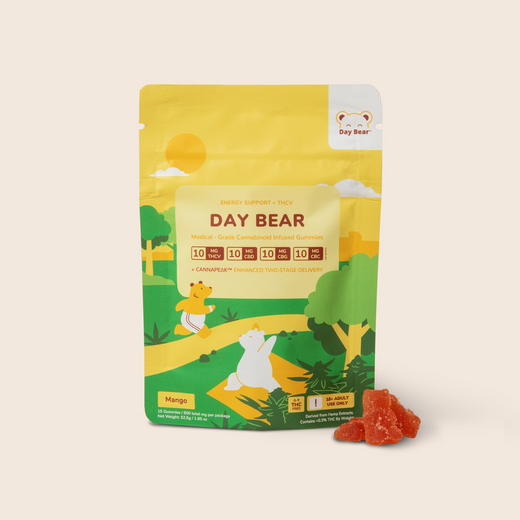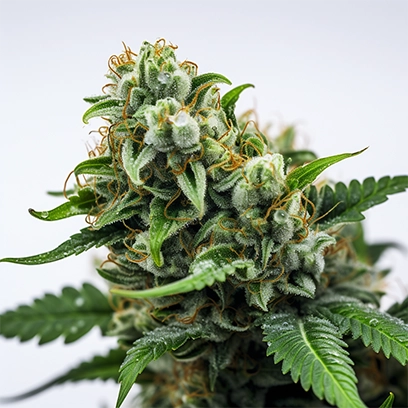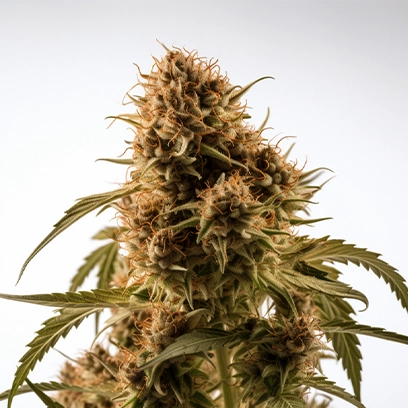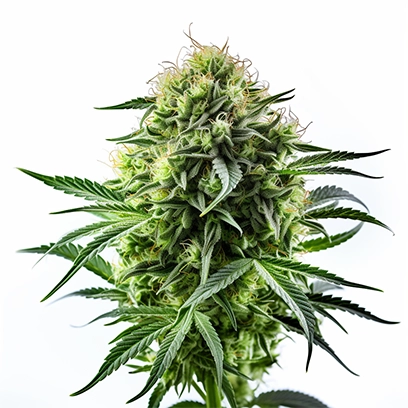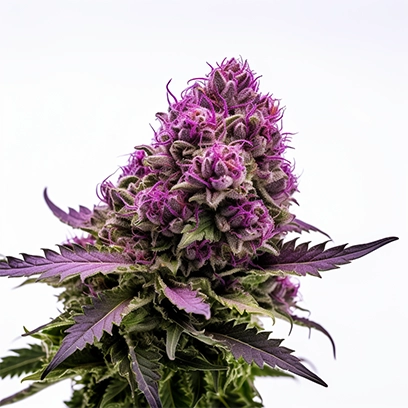THCV 101: A Beginner's Guide To The Energizer Cannabinoid

THCV 101: What is Tetrahydrocannabivarin?
Want a midday energy boost without the jitters? Tired of relying on caffeine to get you going for the day? Well, there’s a new cannabinoid that can help with just that, introducing THCV. In our beginner's guide to THCV, we break down everything you need to know about the “Energizer Cannabinoid” and why you should consider adding it to your daytime routine.
Basic Info:
Name: Tetrahydrocannabivarin (THCV)
Used to Promote - Energy, Positive Mood, Wellbeing
May Provide Support For - Lethargy, Mood, Pain, Inflammation, Discomfort, Stress, Appetite Control, Blood Sugar
Molecular Formula - C19H26O2
Endocannabinoid Receptors - CB1, CB2
Abstract: Not to be confused with its similarly named cousin, THCV is NOT THC! THCV (tetrahydrocannabivarin) is a naturally occurring minor cannabinoid found predominantly in rare sativa phenotypes of hemp and cannabis plants known as "landraces." Research suggests THCV may support energy, mood, and well-being by regulating the body's energy production and manipulating glucose metabolism. When consumed, users of THCV report an increased feeling of energy, euphoria, and focus. THCV has shown it may have benefits as an appetite suppressant and for moderating blood sugar- hence why it’s popularly known as “diet THC.”*
Origins: Tetrahydrocannabivarin (THCV) was discovered as part of the scientific exploration into the complex chemistry of the cannabis plant. This cannabinoid was first identified and isolated in the 1970s, during a period marked by significant advancements in cannabis research. The discovery of THCV was a byproduct of the broader effort to understand the pharmacological components of cannabis. Unlike THC, which is present in abundant quantities in most cannabis strains and known for its psychoactive effects, THCV is typically found in smaller concentrations. The discovery of THCV is a testament to the intricate and diverse nature of cannabis and underscores the plant's potential for offering a wide range of compounds with medicinal properties. THCV is now used as an ingredient in many products, such as tinctures, oils, and edibles.
THCV's Studied Benefits:
Up-regulating Energy Metabolism: Research shows THCV may act as a metabolism booster and energy enhancer. It has shown the potential to enhance energy expenditure, which can lead to increased calorie burning. This effect could benefit weight management and may improve overall metabolic health. THCV has demonstrated the ability to enhance user focus and general energy levels as a byproduct of this increased metabolic activity.* [1,2]
Suppressing Appetite: Unlike THC, which is known to increase appetite, THCV appears to have the opposite effect. It may reduce or suppress the desire to eat, which can be helpful for those looking to control their appetite for weight loss or management.* [1,2]
Improved Mood and Reduced Anxiety: THCV might have anxiolytic effects, meaning it could help in reducing anxiety and panic attacks. This can be particularly beneficial for individuals with anxiety disorders, providing a calming effect without the sedative properties often associated with other cannabis compounds. Research shows that THCV can enhance 5-HT₁A receptor activation. Commonly, enhanced activation of 5-HT₁A receptors is associated with antidepressant and anxiolytic (anti-anxiety) effects, as well as impacts on mood, sleep, appetite, temperature regulation, and other functions related to serotonin.* [3]
Decreased Inflammation and Pain: THCV has shown potential in reducing inflammation and associated pain. This anti-inflammatory effect can be particularly beneficial in conditions like arthritis, where inflammation leads to pain and discomfort.* [4]
Stimulating Bone Growth: Evidence suggests that THCV may promote bone growth. This effect could be significant in treating conditions that lead to bone weakening and degeneration, such as osteoporosis.* [4,5]
Inhibiting Negative Effects of THC: THCV might counteract some of the less desirable effects of THC, such as increased heart rate, intoxication, and memory impairment. By modulating the action of THC, THCV can potentially make the use of cannabis safer and more comfortable, especially for those sensitive to THC's effects.* [3,6]
How To Best Consume THCV:
Mixing CBD and THCV:
Mixing THCV (Tetrahydrocannabivarin) and CBD (Cannabidiol) can potentially offer a unique combination of benefits due to their distinct properties and interactions within the body's endocannabinoid system. CBD is renowned for its anxiolytic and mood-stabilizing effects, helping to alleviate anxiety and stress. THCV also shows promise in reducing panic attacks and anxiety. Together, they may offer a more comprehensive approach to managing anxiety disorders and mood swings, providing both immediate relief (through THCV) and long-term balance (through CBD). Research into the entourage effect suggests that cannabinoids can work better together than in isolation. By combining THCV and CBD, users may benefit from a more holistic and effective therapeutic experience due to the diverse range of actions provided by these cannabinoids.* [3]
Types of Products:
THCV can be naturally extracted from hemp and then infused into various finished products that can be consumed orally, such as gummies, tinctures, soft gels, or vapes. THCV's effects are best displayed when consumed in specialty products that utilize concentrated doses of pure THCV. THCV can safely be combined with other cannabinoids, such as CBD, CBG, or CBC, for more powerful synergetic effects, taking advantage of what is commonly referred to as the entourage effect.
THCV Absorption:
THCV is naturally hydrophobic and, on its own, is poorly absorbed by the human body. One of the most effective ways to consume THCV is in products like our Day Bear gummies which feature our nanoemulsion technology for enhanced absorption. This greatly improves the bioavailability of THCV and other cannabinoids so that you can feel their full therapeutic potential!
Full Spectrum Sources: THCV can also be found in trace amounts in full-spectrum CBD distillate products, oils, tinctures, or gummies. However, these full-spectrum products only contain small amounts of THCV and, therefore, are not concentrated enough to get the full benefits that THCV can offer. THCV can also be found in certain strains of cannabis flower. THCV is usually found in rare sativa landrace strains such as Durban Poison, which naturally has been shown to have THCV percentages that can be as high as 16%. The presence of high THCV in these strains helps to give them their reputation for energy, focus, and mood.
Frequently Asked Questions About THCV!
How can you take THCV?
THCV can be taken in various ways, including orally, topically, or through inhalation. It can be taken in the form of oils, tinctures,edibles, and topical creams. Additionally, it can be taken as inhalable vapor or smoke from cannabis flower.
Is THCV safe?
THCV is considered to be safe to use and is generally well-tolerated. However, it is important to speak to a doctor before taking any new supplements or medications that include THCV. Additionally, it is important to be aware of any potential drug interactions.
Is THCV addictive?
No, THCV is not addictive. It does not produce the same psychoactive effects as THC and is generally seen not to have the potential for abuse or dependence.
Does THCV get me high?
THCV in low doses to medium doses does not produce the psychoactive effects that THC does. THCV produces a natural, non-intoxicating sense of euphoria and wellness.
Will THCV make me fail a drug test?
Drug tests typically look for the presence of THC, not THCV. However, it is important to be aware of any potential drug interactions when taking THCV. THCV can possibly cause a false positive on lower-quality drug tests. It is recommended that you consult the testing authority before taking THCV or refrain from taking products with THCV when being tested.
Shop products with THCV!
Learn About All Our Ingredients
References
1. Δ9-Tetrahydrocannabivarin (THCV): a commentary on potential therapeutic benefit for the management of obesity and diabetes:
Abioye, A., Ayodele, O., Marinkovic, A., Patidar, R., Akinwekomi, A., & Sanyaolu, A. (2020). Δ9-Tetrahydrocannabivarin (THCV): a commentary on potential therapeutic benefit for the management of obesity and diabetes. Journal of Cannabis Research. https://www.ncbi.nlm.nih.gov/pmc/articles/PMC7819335/
2. Efficacy and Safety of Cannabidiol and Tetrahydrocannabivarin on Glycemic and Lipid Parameters in Patients With Type 2 Diabetes: A Randomized, Double-Blind, Placebo-Controlled, Parallel Group Pilot Study:
Jadoon, K. A., Ratcliffe, S. H., Barrett, D. A., Thomas, E. L., Stott, C., Bell, J. D., O'Sullivan, S. E., & Tan, G. D. (2016). Efficacy and Safety of Cannabidiol and Tetrahydrocannabivarin on Glycemic and Lipid Parameters in Patients With Type 2 Diabetes: A Randomized, Double-Blind, Placebo-Controlled, Parallel Group Pilot Study. Diabetes Care, 39(10), 1777-1786.https://pubmed.ncbi.nlm.nih.gov/27573936/
3. The phytocannabinoid, Δ⁹-tetrahydrocannabivarin, can act through 5-HT₁A receptors to produce antipsychotic effects:
Cascio, M. G., Zamberletti, E., Marini, P., Parolaro, D., & Pertwee, R. G. (2015). The phytocannabinoid, Δ⁹-tetrahydrocannabivarin, can act through 5-HT₁A receptors to produce antipsychotic effects. British Journal of Pharmacology, 172(5), 1305-1318. https://pubmed.ncbi.nlm.nih.gov/25363799/
4. The plant cannabinoid Delta9-tetrahydrocannabivarin can decrease signs of inflammation and inflammatory pain in mice:
Gojani, E. G., Wang, B., Li, D.-P., Kovalchuk, O., & Kovalchuk, I. (2023). Anti-Inflammatory Effects of Minor Cannabinoids CBC, THCV, and CBN in Human Macrophages. Molecules. https://pubmed.ncbi.nlm.nih.gov/20590571/
5. Role of cannabinoids in the regulation of bone remodeling:
Idris, A. I., & Ralston, S. H. (2012). Role of cannabinoids in the regulation of bone remodeling.Frontiers in endocrinology,3, 136. https://www.ncbi.nlm.nih.gov/pmc/articles/PMC3499879/



